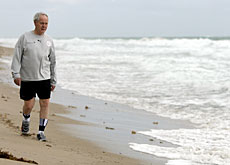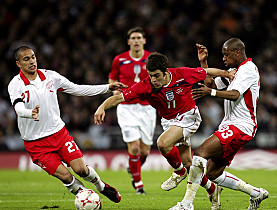Köbi Kuhn

Whatever happens during Euro 2008, Swiss manager Jakob "Köbi" Kuhn can leave with his head held high.
His seven years in charge of the Swiss national team have been shaped by luck, but also by controversy. But despite sharp criticism and already knowing his successor, Kuhn appears calmer than ever before the greatest challenge of his career. So who is Köbi Kuhn?
In the 1960s and 1970s, Köbi Kuhn was the playmaker of FC Zurich and the national side. His style of play was defined by elegance and vision, and his commitment to football has stayed with him.
He started his coaching career with the juniors at FC Zurich and later took charge of the Swiss junior side before succeeding Enzo Trossero as national first team manager on June 16, 2001.
He became the first Swiss manager to qualify for three major tournaments in succession: Euro 2004, the 2006 World Cup and Euro 2008 (admittedly Switzerland qualified automatically as co-hosts).
Nevertheless, Kuhn came close to losing his job on May 15, 2002, after Switzerland lost 3-1 against an average Canadian side in St Gallen.
Despite the odd blip, Kuhn was voted “Swiss of the Year” on two occasions and became a sort of national father figure during the 2006 World Cup in Germany.
But his stock soon plunged, according to surveys judging the most popular inhabitants of Zurich. Two events harmed his reputation: the Swiss team performing badly to be knocked out of the World Cup by Ukraine, and the subsequent sacking of team captain Johann Vogel.
This move brought back memories of the start of his reign as national manager, when he did not shrink from excluding key players Stéphane Chapuisat and Stéphane Henchoz. In addition, his differences with Blaise Nkufo are not forgotten, even if they appear to have been smoothed today.
In May 2007 former Swiss national player Adrian Knup was appointed as a “team advisor” to provide a link between players and coaches in an effort to avoid further fall-outs.
Authority
However, Kuhn’s authority and his good standing with current players is not in dispute, as swissinfo found out.
“I have been in close contact with Köbi Kuhn for eight years and I have never had a problem with him. He is sincere and honest with people,” said current captain Alex Frei.
Defender Johan Djourou agreed. “He will say the same thing whether you are there or not. You never experience nasty surprises with him. For example, he communicated his decision to step down after Euro 2008 in a way that removed doubts and speculation.”
For fellow defender Ludovic Magnin, the team’s performance under Kuhn speaks for itself, making him one of the best managers Switzerland has ever had.
“[Kuhn] has succeeded in forging a genuine team spirit. I can assure you that the atmosphere is very different now than in 2000, when I first broke into the side,” he said.
“I believe the people who criticise him now are the same people who showered him with plaudits during the World Cup,” said Philippe Senderos. “Köbi has not changed – just the public’s perception of him.”
Of course, this father figure image must contain a few flaws. “There are only a few small steps from superstar to scapegoat,” Kuhn himself said at Euro 2004 in Portugal.
But his decision to step down after Euro 2008 and hand over to German manager Ottmar Hitzfeld has relieved some of the pressure to maintain his nice guy reputation. For the first time he will be completely free to lead his team without inhibitions.
Köbi the curfew buster
Köbi Kuhn could be a temperamental person and sometimes did crazy things, according to former players who knew him.
“I find it ingenious how Köbi created and maintained this image all these years,” said former international and respected manager Umberto Barberis. “The ‘official’ Köbi is not the one I knew.”
Two episodes from Kuhn’s playing days with the national team support this view and feed doubts about his good-natured father figure image.
The first was during the 1966 World Cup in England when Kuhn and teammate Werner Leimgruber were dropped for the game against West Germany after arriving back at the team hotel late one night. Switzerland lost 5-0 and the incident became known as the “Scandal of Sheffield”.
Twelve years later in Norway, Kuhn and Joko Pfister broke the curfew and were temporarily dropped. This incident entered Swiss football folklore as “the Night of Oslo”. Sheffield, Oslo… and perhaps the “Night of Vienna” on June 29?
swissinfo, Matthias Froidevaux
Jakob “Köbi” Kuhn was born on October 12, 1943, in Zurich, where he began his playing career at the age of 17. (FC Wiedikon 1954-1959, FC Zurich 1960-1977).
Kuhn won the league championship six times and was cup winner with FC Zurich five times. He played in two European Cup semifinals against Real Madrid and Liverpool.
He played 63 times for the national side, including the 1966 World Cup in England.
He started his coaching career with FC Zurich (1983-1984) and became youth manager of the national side in 1996 (under-18 and under-21). In June 2001 he succeeded Enzo Trossero as national first team manager.
He is the first Swiss manager to lead his side in three major tournaments (Euro 2004, 2006 World Cup and Euro 2008).

In compliance with the JTI standards
More: SWI swissinfo.ch certified by the Journalism Trust Initiative











You can find an overview of ongoing debates with our journalists here . Please join us!
If you want to start a conversation about a topic raised in this article or want to report factual errors, email us at english@swissinfo.ch.